Body Parts in Portuguese — the Ugly, and the Funny
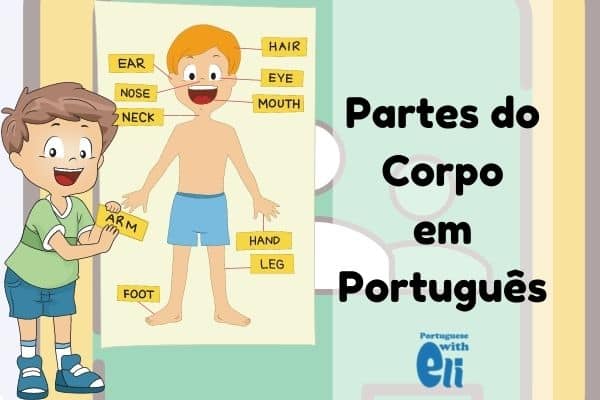
Using the names for the body parts in Portuguese isn’t simply a matter of taxonomy.
Well, that might be, if you only wanted to describe where it hurts.
But say you’re talking to your Brazilian friends and one of them came up with:
Ok, I’ll let you twist my arm.
What the heck does it mean?
So, in this short guide, you’ll have not only the words for the body parts in Portuguese; you’ll be able to use them (the words!) like Brazilians do.
And, of course, you’ll have the Portuguese vocabulary for body parts in English and Portuguese (but not many tables; I have much more in store for you).
How We’re Going About Looking into the Body Parts
In this guide, we are going from general to specifics.
And because it’s mostly vocabulary, I have included both images and tables. Images will help you remember and memorize the words without having to resort to your native language. And tables are there to include extra vocabulary that might be interesting.
And first we are going to take a look at the body parts in Portuguese.
An Overview of the Body in Portuguese
Just a quick pointer here, when you use “o cabeça” with the masculine article, it actually means “the boss or leader of something”.
You can use it in the feminine to mean the same, but it’s not common.
Ele é o cabeça por trás dessa bagunça toda. He’s the leader and the mind behind all this mess.
| O corpo | The body |
| A cabeça | The head |
| O tronco | The upper body |
| Os membros | The limbs |
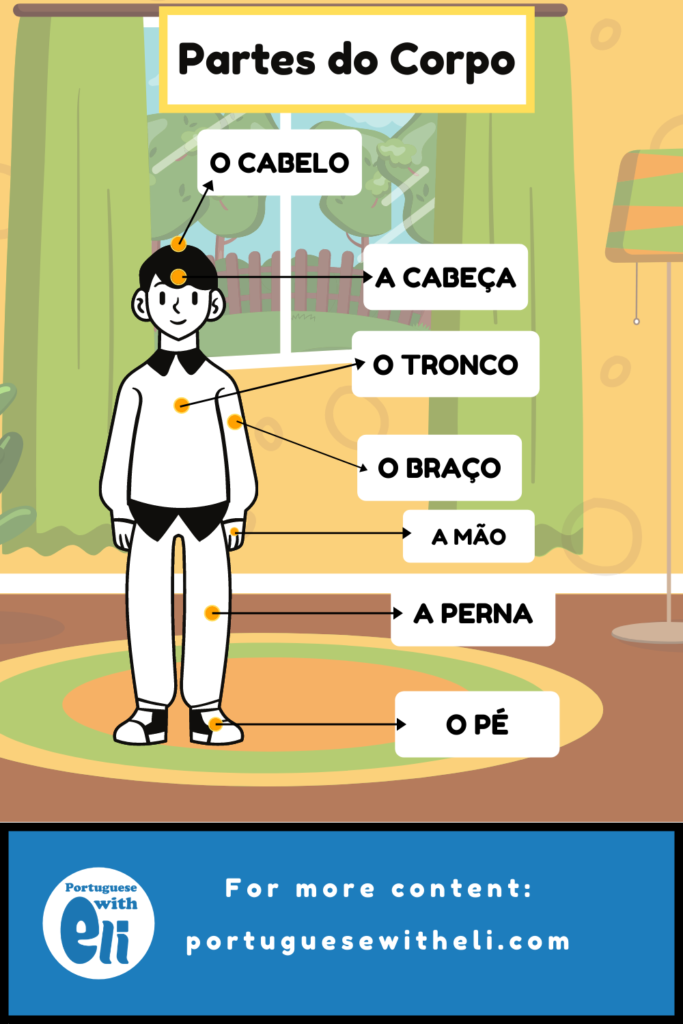
Now, let’s take a look at the face.
| A cabeça | The head |
| O cabelo | The hair |
| O rosto / a cara | The face |
| A testa | The forehead |
| Os olhos | The eyes |
| O nariz | The nose |
| A narina (usually plural) | The nostril |
| A orelha (usually plural) | The ear, the part you can hold |
| O ouvido | The ear, but the part you can stick your finger in |
| A boca | The mouth |
| Os lábios (informal: os beiços) | The lips |
| O queixo | The chin |
| O pescoço | The neck |
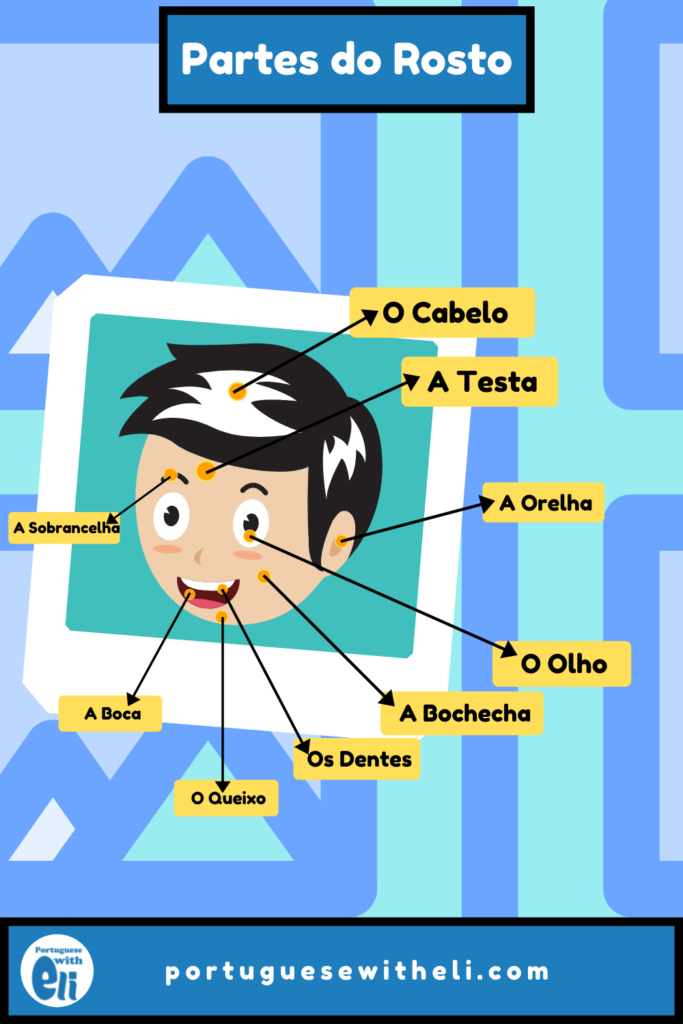
And just two things.
You see there are two words for “face”, cara and rosto. (We also use “a face”, but that’s technical).
Although we use both of them interchangeably, some people might not like the word “Cara”. It’s because it’s somehow associated with animals.
Quem tem cara é cavalo. Horses have faces. This is a common reply to someone who said something about your face using the word “Cara”.
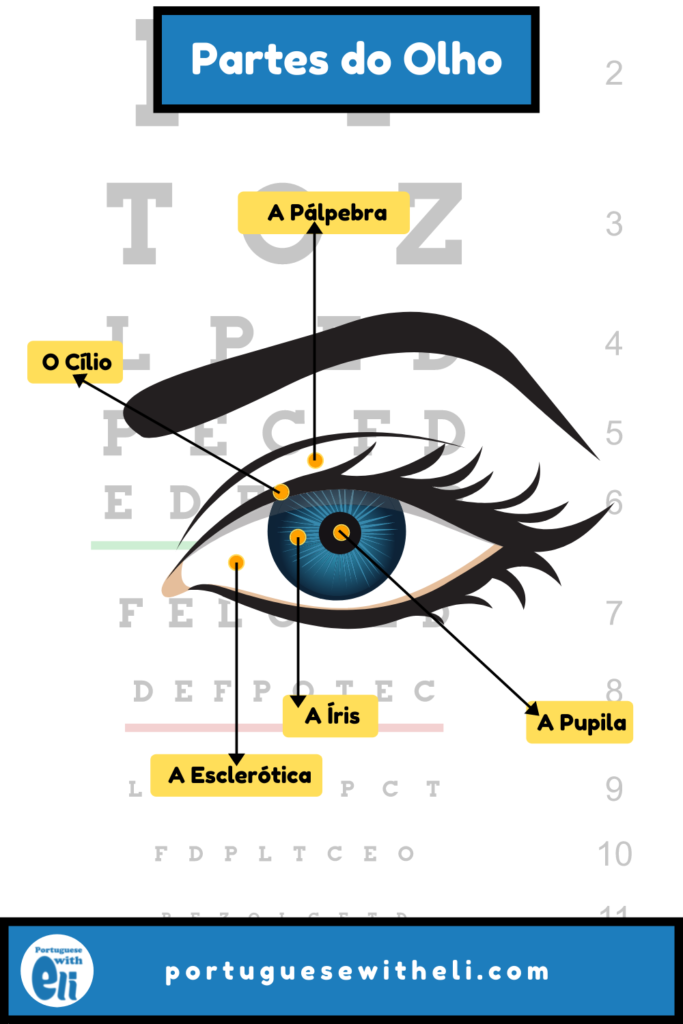
Upper Body in Portuguese
Because the upper body in Portuguese has more words that might be informal, I’m including the observations in the tables themselves for quick reference.
| O tronco | The trunk |
| O tórax, o peito | The chest |
| Os seios (but Brazilians tend to use “peito” for this, too) | The breasts |
| Os mamilos | The nipples |
| A barriga (highly informal: o bucho) | The belly |
| O umbigo | The belly button |
| Os ombros | The shoulders |
| As costas (Always plural!) | The back |
| A espinha, a coluna (informal: o espinhaço) | The spine |
| O quadril (usually plural: quadris; informal: as cadeiras) | The hips |
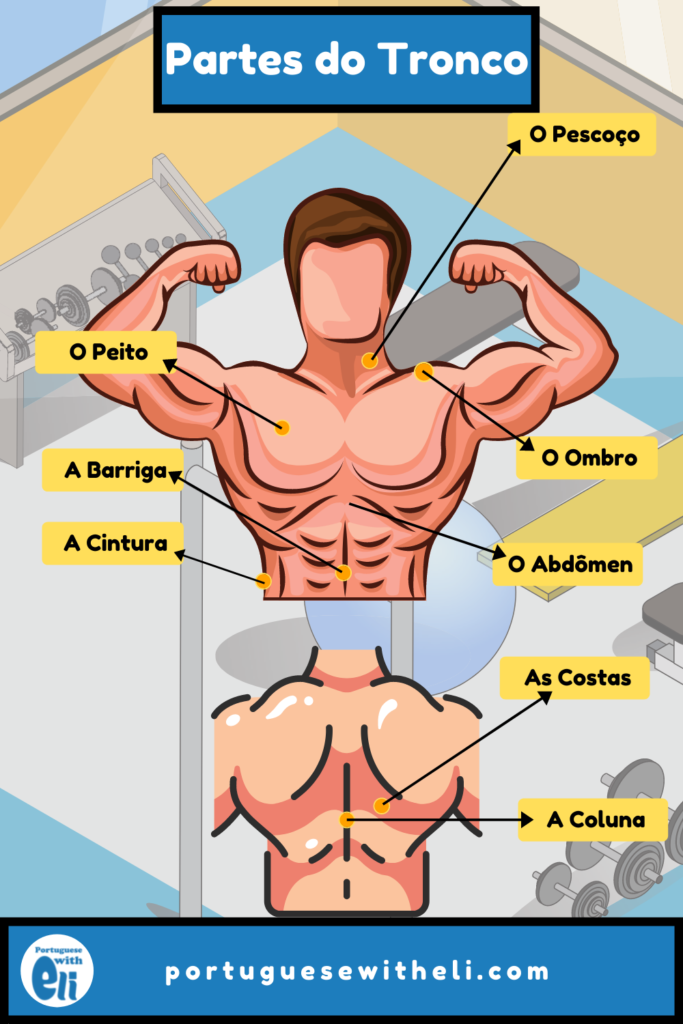
Quick Pro Tip
Some parts of the body accept the suffix -udo. It indicates that whatever part is being talked about is either big/developed or draws a lot of attention because it is big.
- Troncudo. From tronco, trunk.
- Olhudo. From olho, eye.
- Narigudo. From nariz, nose.
- Orelhudo. From orelha, ear.
- Bocudo. From boca, mouth.
- Pescoçudo. From pescoço, neck.
- Peitudo. From peito, breast.
- Queixudo. From queixo, chin.
- Barrigudo. From barriga, belly.
If use those words, you’ll sound way more natural in Brazilian Portuguese.
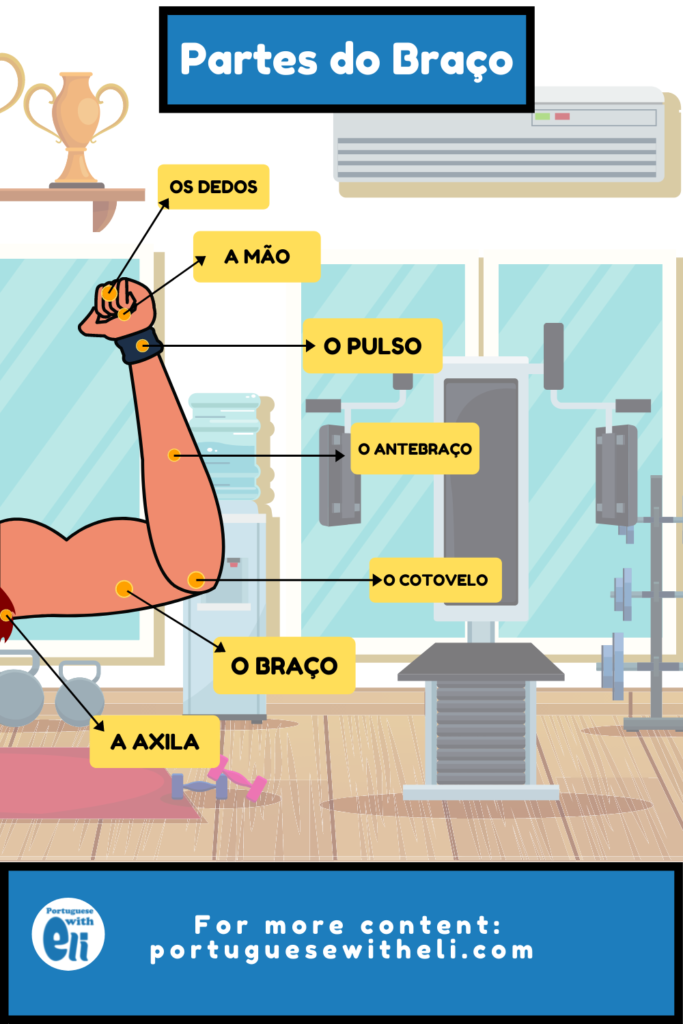
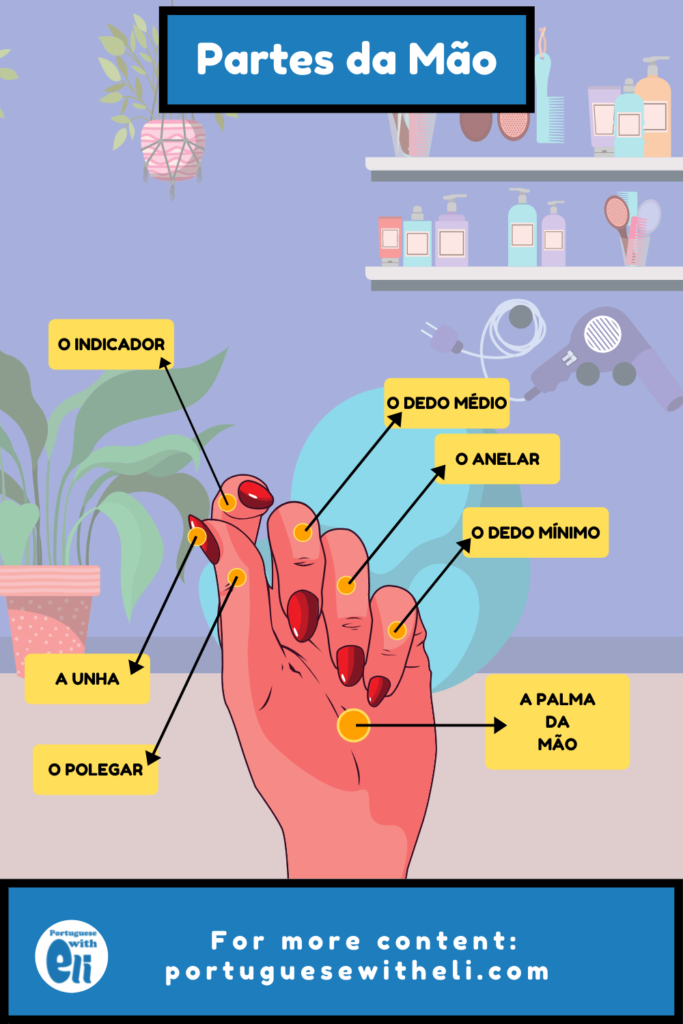
Lower Body in Portuguese
Again, a few more tables, but I’m including here some words for the intimate parts of the body.
Please pay attention that using some of them might draw funny looks. These terms tend to be taboo-isms — that’s the Portuguese terminology for words that might offend groups of people.
But as a Brazilian, I have to say we use most of the time the vulgar versions of the words. So you might as well learn them right now in a safe space.
| Da cintura para baixo – gerais | From the waistline down – general vocabulary |
| O pênis (informal, vulgar: o pau) | The penis |
| Os testículos (informal, vulgar: o saco, os ovos) | The testicles |
| A vagina (informal, vulgar: a xana) | The vagina |
| As nádegas (informal: o bumbum; informal, slightly vulgar: a bunda) | The buttocks |
| O ânus (informal, vulgar: o cu) | The anus |
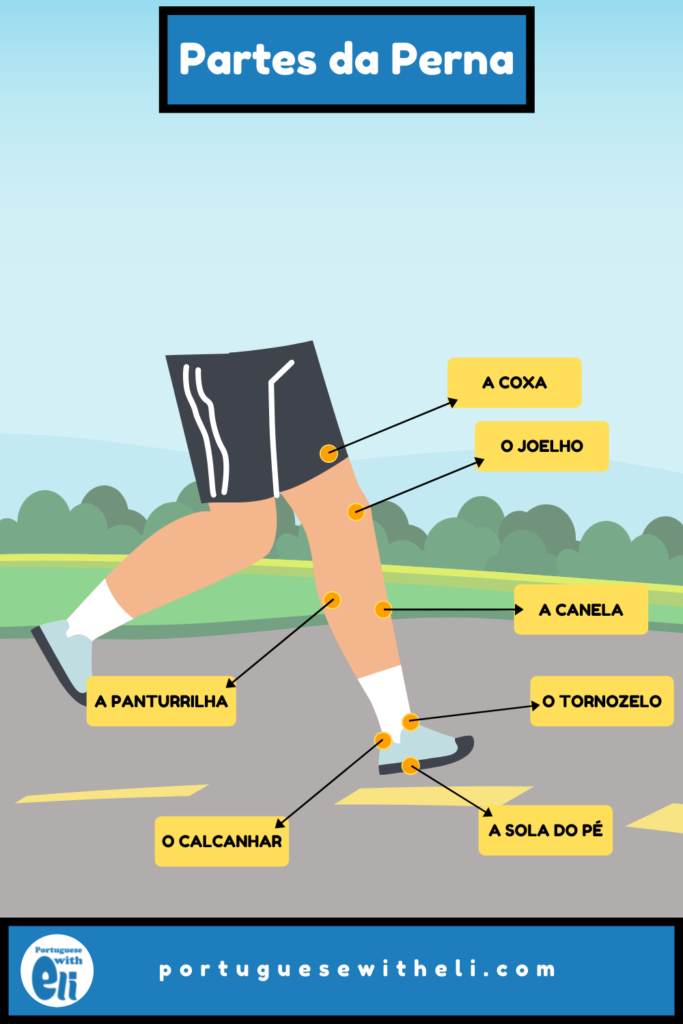
Specific Parts of the Body that didn’t Fit Anywhere Above
Because these terms are related to the body, I decided to include them here. But again, lots of images. I suggest you either bookmark this page or check our Pinterest profile and pin the images for later reference.
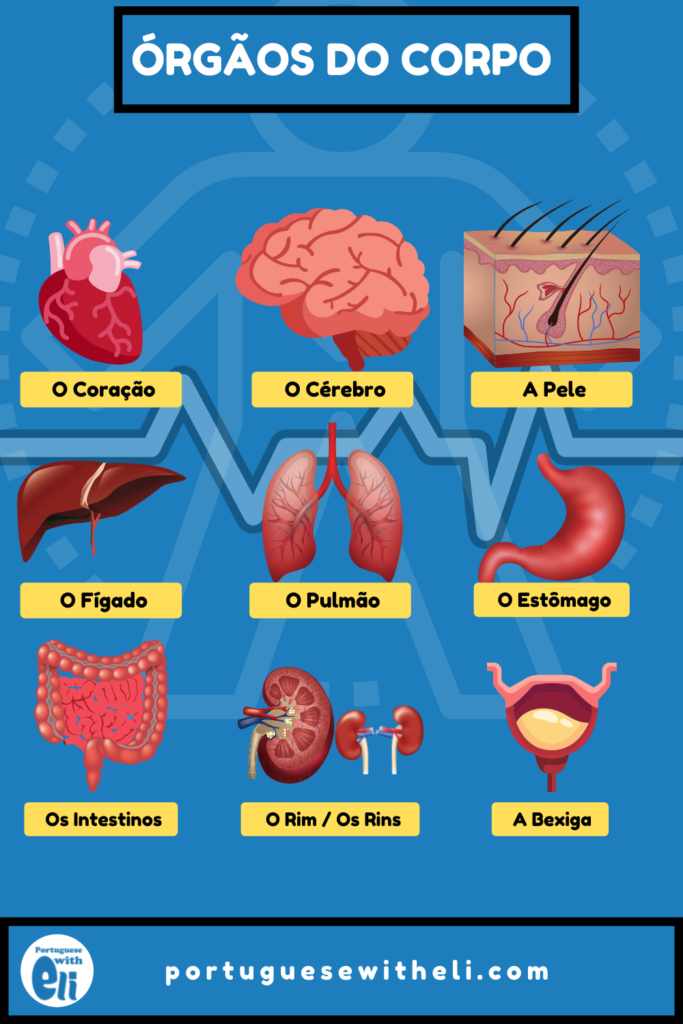
Is this all? Of course not. Brazilians are imaginative — they come up with words to describe someone’s body type on the spot. These are just a starting point. Keep your ears wide open and listen for the expressions Brazilians use.
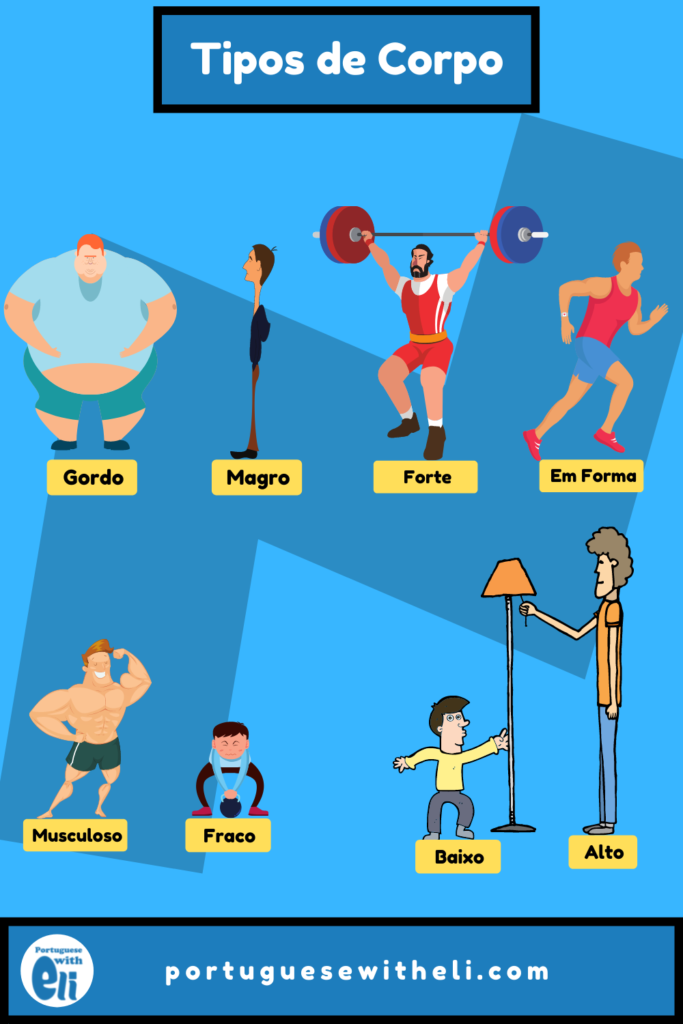
And when in doubt — ask.
Expressions Involving the Body Parts in Portuguese that You Can Use Right Away
And I mean, you can use the expressions, not the body parts.
The terms for the parts of the body in Portuguese are among the high-frequency words of the Portuguese language.
As such, it surprises nobody that they are also part of several informal expressions.
I’m going to give you some here that you can use right away. You will probably hear then at least once a week.
They involve insulting, financial situation, failures, deception, and money. Things we all talk about on a daily basis.
Cara de…
This is a very common insult and it can range from childish improper words to highly sophisticated insults.
It all depends on how you complete it.
A famous character from a children’s book series, Emelia repeatedly said “owl’s face” as an insult.
But you can literally complete that with anything you want.
- Você é um cara de cu. You’re an ass face (a jerk).
- Ele é um cara de sapo. He’s a frog face (perhaps ugly).
Quebrar as pernas de alguém.
Apart from doing the physical action of fracturing someone’s leg bones, it also means to so hamper with someone’s things that this person can’t perform whatever they are supposed to do.
That’s a fancy way of saying to F### someone up.
- Olha, aquele dinheiro que você não me pagou de volta quebrou minhas pernas. Look, that money that you didn’t pay back really F***ed me up.
Quebrar a cara.
Again, you might punch someone in the face and break it. But apart from its literal meaning, “quebrar a cara” expresses the fact that your expectations have been broken.
- Se você repetir isso, eu vou quebrar a sua cara. If you say that again I’ll brea your face.
- Eu pensei que ela gostava de mim, mas ela só queria ser minha amiga. Quebrei a cara. I thought she liked me but she wanted to be only a friend. My expectations have been broken.
Passar a perna em alguém.
That’s my all-time favorite.
And it has nothing sexual about it.
When someone passes the leg on you — or you might do that too, if you are not very honest — this person deceives you, usually for personal gain.
If you’re in Brazil and you want to buy something on the streets from the street shops, I suggest you either prime up your Portuguese or have a trustee Brazilian friend who can help you translate stuff.
If you’re not careful, they will pass the leg on you.
- Não acredite nele! Ele está querendo passar a perna em você. Don’t believe him — he’s trying to fool you (He’s trying to rip you off).
- Que filho da mãe! Ele passou a perna em mim! Son of a bitch! He fooled me!
Mão fechada.
This one is easy — if someone doesn’t open his hand easily, he won’t spend money that frugally.
And a “closed hand” person is someone who is stingy. This person isn’t generous. He won’t spend money even when necessary.
- Eu não gosto de pedir nada ao meu marido porque ele é muito mão fechada.I don’t like to ask anything from my husband because he’s such a stingy person.
Ter o olho 👁 maior que a barriga.
Although you can use this expression to talk about a greedy person, you would normally use it to talk about a glutton — someone who eats too much.
But because this person’s belly is smaller than this person’s eyes, they’ll usually waste food and ask for more than what they can handle.
- Eu não vou te oferecer nada, porque sei que você está cheio. Você só tem o olho maior que a barriga. I’m not going to offer you anything because I know you are full. You just have the eye bigger than the belly.
Colocar Olho Gordo
Another expression that might cause confusion is “olho gordo”.
When someone lays a “fat eye” on something, it means this person is envious, jealous, covetous of something. And because they laid eyes on it, it’s going to wither away, die, break down, or just stop working at all.
- Não conte nada para ela. Ela vai colocar olho gordo e tudo vai por água abaixo. É melhor você guardar os seus sucessos para você mesma. Don’t tell her anything. She’s going to lay a fat eyes on it and everything is going to go down the drain. You had better keep your successes to yourself.
Dar o braço a torcer.
Brazilians resort to this expression to avoid hearing “I told you so!”
When you give your arm for twisting, it means that you admit that you were wrong and that someone else’s is right. It doesn’t necessarily mean someone is right, but we presume that whatever belief you firmly held turned out to be ineffective or false you want to admit that fact.
- Eu não acreditava que isso fosse ser tão bom. Eu tenho que dar o braço a torcer. I didn’t believe this would be so good. I have to admit it.
- Olha, eu vou dar o braço a torcer. Você realmente é um ótimo profissional. Look, I must admit. You are a great professional.
Wrap-up
So, what do you think? Is there any part of the body whose name in Portuguese surprised you? And tell me, are there any expressions using parts of the body in your language? Which one do you like most?
Let me know in the comments below 🙂
And for more vocabulary, you can always go to our vocabulary section.





Hello! I see there aren’t any comments, and I wanted to let you know that this is hugely helpful for me!!! Thank you so much for your time and effort making all these diagrams and explaining how to use the vocabulary more like a native speaker. You’re awesome!
É muito simpático de sua parte me dar um feedback 🙂 Thanks so much! And I’m glad it helps!